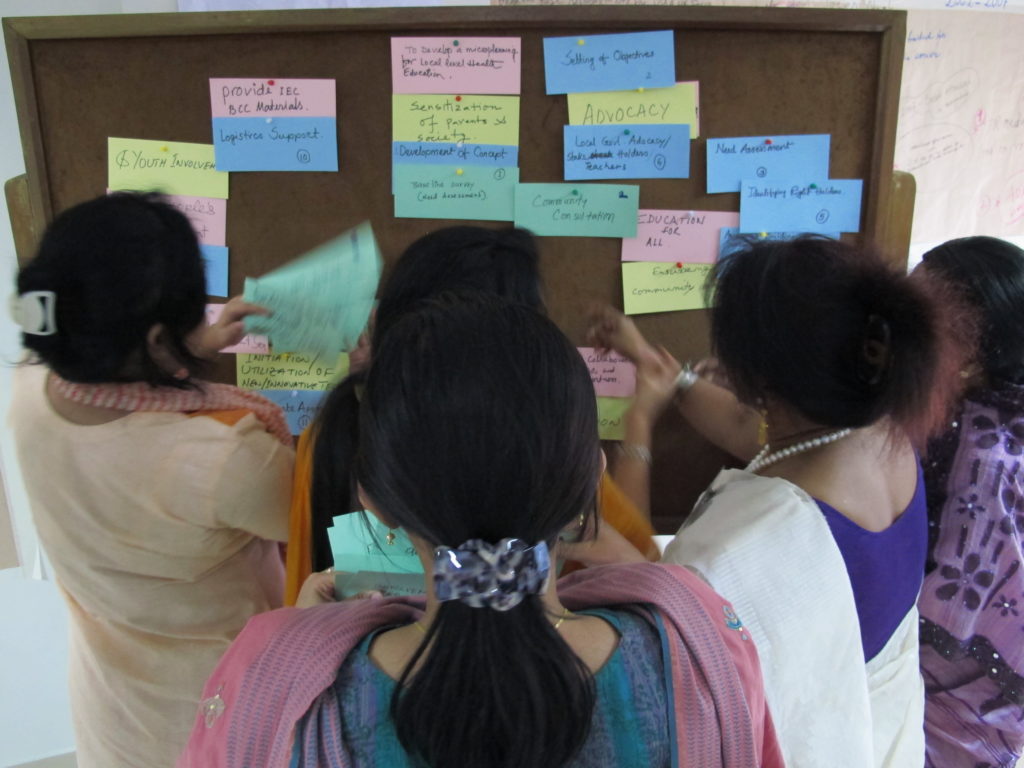Communication for Development (C4D)
Formative Research:
Conducting secondary data analysis, as well as designing and implementing qualitative and quantitative research studies on human behaviour and its determinants. We especially focus on participatory research methods and rapid assessment techniques that can be used to explore knowledge, attitudes and practices (KAP) such as ‘Most Significant Change Stories,’ Focus Groups, Appreciative Inquiry, Community Dialogue, and Delphi techniques.
C4D Programme Design and Strategy Development:
Providing high quality conceptual, analytical and synthesis support to inform the design of innovative social and behaviour change (SBCC) programmes and projects that reflect cultural nuances and field realities. Our expertise includes changing both individual behaviour and social norms and integrating community engagement and social mobilisation as change processes. We also conduct strategic reviews that enhance the role and impact of C4D within broader development and humanitarian programmes.
Capacity-Building in Social and Behaviour Change:
Developing and administering learning needs assessments, designing training packages and conducting capacity development/training workshops on social and individual behaviour change tailored to a range of participants – from community level workers to senior managers/decision-makers. Human rights-based approaches (HRBA) and principles are fundamental to our C4D training, which ranges from introductory to advanced level workshops and executive C4D briefings for senior managers. Specialized C4D workshops are available on: advanced skills development in research, monitoring and evaluation; new media; policy advocacy especially in the context of middle-income countries; and emergency preparedness & response.
One of M & D Consulting’s most innovative offerings is the Change Makers Experiential Learning Lab approach to capacity building around C4D and overall programming. These unique, human-centred learning events are rooted in human rights-based approaches that bring out each participant’s inner change maker using experiential, participatory and peer-to-peer learning methodologies that ensure country teams can then bring these dynamic people-powered social change tools, knowledge and skills to their own programming teams and stakeholders. Rather than approach capacity building as external/expert-driven training, Learning Labs utilize the latest in adult experiential learning. The C4D/SBCC Learning Labs have already been successfully field tested in Africa, Asia and Latin America and have been shown to yield deeper, most lasting learning results than traditional ”expert/external-driven” training or workshop approaches. To reinforce and sustain deeper learning and relationship-building amongst participants and facilitators over time, efforts are initiated to establish communities of practice which also provide opportunity for valuable peer-to-peer learning and support over the longer term. Our ultimate end goal is to enable participants to astutely embed C4D into their own sectoral and inter-sectoral programming, thus maximizing opportunities to harness the power of social and behaviour change to accelerate desired outcomes. Please visit Change Makers Experiential Learning Lab for more details about the Change Makers approach.
Participatory Monitoring and Evaluation:
Leveraging our technical knowledge and extensive field experience to develop both traditional and innovative behavioural monitoring protocols and conduct ongoing programme reviews as well as mid-term and final evaluations of behaviour and social change interventions. Our methodologies include traditional quantitative (surveys, etc.) and qualitative (KAPs, individual interviews, etc.) approaches, as well as innovative, participatory approaches such as: Community Dialogue, Appreciative Inquiry, and Most Significant Change Stories.
Examples of Most Recent Projects:
- UNICEF/Pakistan – Design C4D Toolkit Development, Conduct C4D Training Workshops and Develop Office-wide C4D Strategy, 2016-2018
- UNICEF-Polio/Geneva Unit – Technical Assistance and Capacity Building for C4D Polio Outbreak and Response, 2016-2018
- UNICEF/Eritrea – C4D Cross-sectoral Strategy for 2017-2021 Country Programme, 2017
- UNICEF/Lebanon – Capacity-Building on C4D and Community Engagement, 2016
- UNICEF/South Asia Regional Office (ROSA) – Develop C4D Regional Framework, 2016-2017 (NEPAL)
- UNICEF/Europe and Central Asia Regional Office (ECARO) – Develop C4D Regional Framework, (Switzerland), 2016-2018
- UNICEF/Swaziland – Design and develop C4D One-Stop Centre and National Cross-Cutting Strategy, 2016-2017
- UNICEF/Tajikistan – Design a Communication for Social Change Strategy and Awareness Raising Campaign on Social Inclusion of Children and Women with Disabilities, 2016-2017
- UNICEF/Kenya – Comprehensive Assessment of C4D Capacity Gaps/Needs and Designing a Capacity Development Plan and Training of Trainers, 2015-2016
- UNICEF/Malawi – C4D Capacity Development for UNICEF staff and key Partners, 2015
- UNICEF/Middle East and North Africa (MENARO) – C4D Capacity Development for UNICEF regional Partners, 2014

